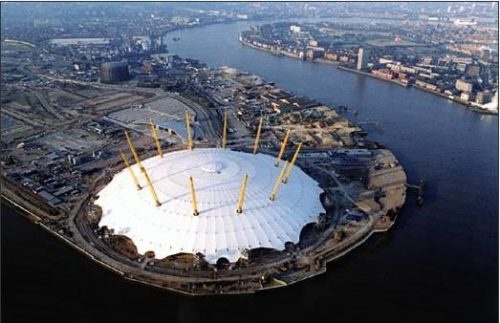The Millennium Dome, also referred to simply as The Dome, is the original name of a large dome-shaped building, originally used to house the Millennium Experience, a major exhibition celebrating the beginning of the third millennium. Located on the Greenwich Peninsula in South East London, England, the exhibition was open to the public from 1 January to 31 December 2000.
The dome is one of the largest of its type in the world.Externally, it appears as a large white marquee with twelve 100 m-high yellow support towers, one for each month of the year, or each hour of the clock face, representing the role played by Greenwich Mean Time. In plan view it is circular, 365 m (one metre for each day in a standard year) in diameter. It has become one of the United Kingdom's most recognizable landmarks. It can easily be seen on aerial photographs of London. Its exterior is reminiscent of the Dome of Discovery built for the Festival of Britain in 1951.

The architect was Richard Rogers and the contractor was a joint venture company, McAlpine/Laing Joint Venture (MLJV) formed between Sir Robert McAlpine and Laing Management.The building structure was engineered by Buro Happold, and the entire roof structure weighs less than the air contained within the building. Although referred to as a dome it is not strictly one as it is not self-supporting, but is, in fact, a giant Big Top, the canopy being supported by a dome-shaped cable network, from twelve king posts.For this reason, it has been disparagingly referred to as the Millennium Tent.The twelve posts represent the twelve months of the year, another reference to time in its dimensions, alongside its height and diameter.
The canopy is made of PTFE-coated glass fibre fabric, a durable and weather-resistant plastic, and is 52 m high in the middle – one metre for each week of the year. Its symmetry is interrupted by a hole through which a ventilation shaft from the Blackwall Tunnel rises.